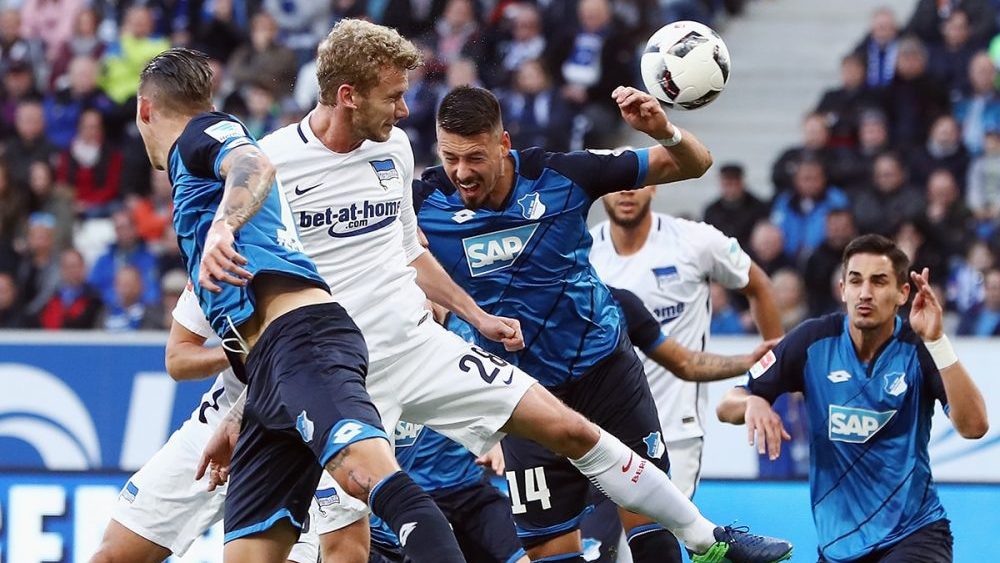Preview: FC Bayern – TSG 1899 Hoffenheim
Before the 10th matchday, we spoke with Julian Ritter. The blogger concerns himself with Hoffenheim and gives us a few interesting insights into the life of the club.
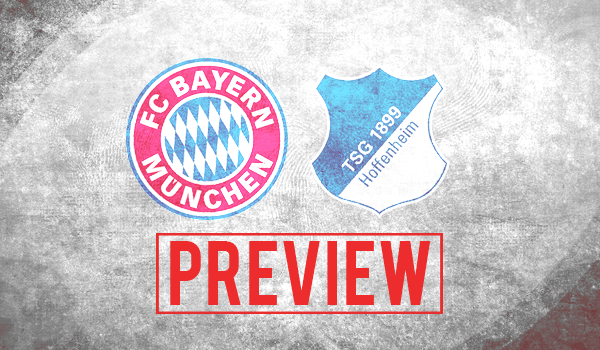
Hi Julian, could you introduce yourself to our readers quickly please? What do you do, and how did you end up a Hoffenheim fan?
I’ve blogged irregularly for five years at neureich-bimbeshausen.de and I also set up a Twitter account for the site. I ended up with Hoffenheim because my dad took me with him to the local sports ground. At the time there was a swing and a slide behind one of the corners of the pitch, the pitch is just on the hill. I was allowed to spend my first games there, mostly. At some point the pitch was built up into a small stadium, Bayern came to the unveiling and I think René Lahr scored the goal in a 4-1 defeat. In the following years I watched as TSG rose and rose, and then at some point I was a fan of a Bundesliga team.
In 2008 Hoffenheim started furiously in their first Bundesliga season, but fell apart in the second half of the season and ended up in 7th place. That placing is to date their best performance in a season. How do you assess the past eight years overall?
In 2008 the possession statistics were seen on television as showing that the team was better with more possession. In that moment in time, Rangnick’s football was too fast, too direct, too imposing, and so it was very successful. You can read through neutral reports of games at the time to pin down, just how new that style of play was. A tide came about, everybody played in a way they’d never played before, and that couldn’t last forever. In spite of it all, the second half of the season wasn’t actually as bad as it was made out in hindsight, for example during that time there were only five defeats, and since then no team has finished in 7th place with so many points (Gladbach came fourth last season with the same points). The years after that don’t really give a very consistent overall picture. Despite big transfer fees, Rangnick didn’t go beyond mid-table. With the belief that there had to be a manager who could achieve that, between his departure and Gisdol taking office, there were five managers in a little more than two years. Under Gisdol it was 9th and 8th place, and after two and half years, as well as an interim phase under Stevens and Nagelsmann, it’s the latter, who nobody expected being anything more than mediocre, who is consistently generating the results of a top team.
Rangnick has definitely been a defining figure for Hoffenheim. How much of his work is still present at the club, and what’s fundamentally changed in the aftermath?
It’s hard to separate what was specifically Rangnick’s influence and where Bernhard Peters, now at HSV, was in charge in the decisive phase from 2006-2009. A few points of their cooperation: that Hoffenheim was a pioneer in keeping the style of play similar between the youth sides and the senior team, and hiring managers who toe that line. That the reserve team also serves to prepare managers for the Bundesliga team, as was the case with Gisdol and now with Nagelsmann. That no Hoffenheim team barricades itself in front of their own goal, and instead wants to play football, fast and imposing. A fundamental change in the post-Rangnick phase up until Alexander Rosen took the job was that those in charge were ready to overlook a lot of that upon short-term mishaps. That cost Hoffenheim a few reserve players like Pascal Groß, Jonas Hofmann, Davie Selkie. Niklas Süle was probably also set to leave, if Markus Gisdol hadn’t made clear that finally the reserves would be relied upon again.
How do you cope with the same old critical voices against Hoffenheim that are still heard?
Criticism which goes beyond “Despite Leipzig your mother is still a w***e” I don’t really read that often, but I love it.
What does the club stand for, and what kind of philosophy is in place?
In the Bundesliga’s current marketing situation, Hoffenheim perhaps stands for coming back down to Earth. Not throwing around terms like ‘philosophy’ about itself. Not having the pretensions as a football company to define true love or being the mid-point in life of young Asians, offering a replacement religion or becoming a part of a lifestyle. “One team. One way. A one-off.” was written by Hoffenheim on their flags. A football club from the village that pushes promotion from within to the highest level and whose men’s team is included among the best football teams of the country. That’s it.
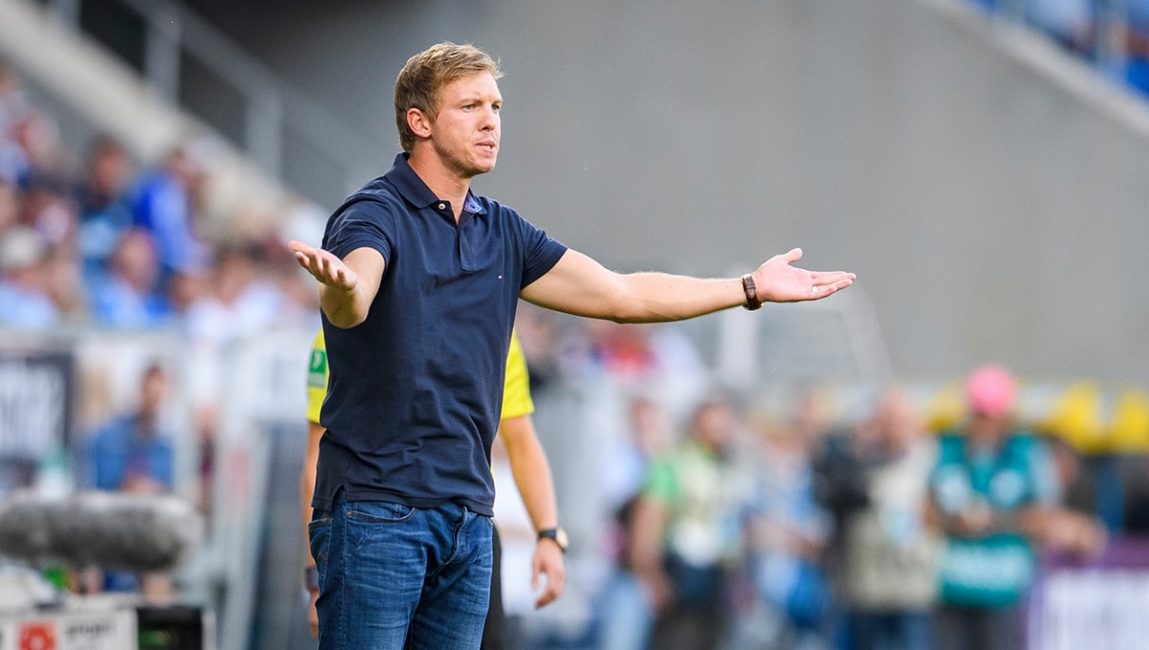
(Photo: Alexander Scheuber / Bongarts / Getty Images)
Julian Nagelsmann is the youngest Bundesliga manager in history, but he’s already one of the most sought-after. What kind of football does he stand for and what makes him so special?
He can explain his own football a lot better himself than I can. He also likes doing that when you ask him about it – in the FAZ Newspaper he answered a lot of questions. On the surface what makes him special is that, after an early switch from player to coach, at 29 he’s already in a position to successfully lead a Bundesliga team, both from a tactical and a human stand-point. Here I can happily point to a few passages from an interview with Matthias Kaltenbach (his current assistant manager in the senior side and at the time his assistant with the under-19s), which you can read on my blog.
What short term goals can you aim for, and where should Hoffenheim aim for in the mid-to-long-term?
For Hoffenheim, in the short-term it’s about winning the next game. We’ll come to that shortly. In the mid-term it be great to stay in the Bundesliga and, if the opportunity comes along, to play international football. In the long term we need to see how far you can get with promotion from within, good scouting and making a profit in the transfer market, if the club is to be self-sufficient without input from the Hopp family.
What kind of line-up and style do you expect from Nagelsmann’s side in Munich?
I see a lot of possibilities there. The most obvious would be the successful system of recent weeks set up basically in a 5-3-2. But there are lots of possibilities for surprises. In Mainz for example, the team didn’t just shift a little bit between their own possession and the opposition’s possession, but rather completely changed and basically had two very different formations that switched minute-to-minute. So a lot is possible. A completely passive 6-3-1, like some clubs have gone with in recent years in Munich, isn’t to be expected though. Nagelsmann will have observed Bayern’s weaknesses that have come up since Pep’s departure, and set the game up based on those.
How will the game end up?
When I see how PSV or Augsburg needed such short phases of pressure to score, I can imagine Hoffenheim managing that too. The aim will be to go out and score more goals than Bayern can, but that’s rarely achieved. On the other hand: Nagelsmann’s record with the under-19s was a 6-0 and a 5-0 away win against Bayern.
If you could choose a Bayern player to have at Hoffenheim, who would it be and why?
Joshua Kimmich. He’s not quite as old as many other Bayern players, from whom you wouldn’t get joy from for quite so long. Kimmich, with his Stuttgart-Leipzig education, his understanding of the game, his presence in pressing, could be an acceptable replacement for Rudy, in case he doesn’t extend his contract.
Bayern are still undefeated against Hoffenheim. A lot of factors will contribute to whether that streak continues.
Scouting report
Nagelsmann breaks with the mainstream
Hoffenheim are playing like a top team. Obviously as a fan or somebody in charge you’d see that a little more calmly. The club is able to assess itself and its means, in spite of Dietmar Hopp, very realistically and then formulate their aspirations accordingly. The sporting component is particularly thrilling right now. If you want to personify this partial success, you must go no further than Julian Nagelsmann. The youngest manager in Bundesliga history is seen as a tactical fox.
That reputation is deserved so far. Adjustments to the opponent or the run of play, flexibly shifting systems, clearly recognisable ideas, and an influence that has been conveyed to the team within very few weeks. Here Nagelsmann breaks with the mainstream of the Bundesliga, and as well with a few ‘core competencies’ which are carried out by teams from the bottom third of the league every day.
Here we refer, for example, to sentences like “provoke duels”. The Hoffenheim manager’s idea is to be as well-staggered as possible and to force the opponent into mistakes through unified movements. Direct duels are only conducted by Hoffenheim if it’s truly necessary, or the outlook of success is considerably high. They play high up tactically as a team, close down the opposition early but try to thus provoke inaccurate passes.
For Nagelsmann, direct duels are a little too reliant on chance. The ball can bounce away or you can just be unfortunate. Lately Hoffenheim have tried a 5-3-2 line-up, which is also seen as a likely option against Bayern. The wing-backs always tilt towards the ball-near side, to put the opponent under pressure there.
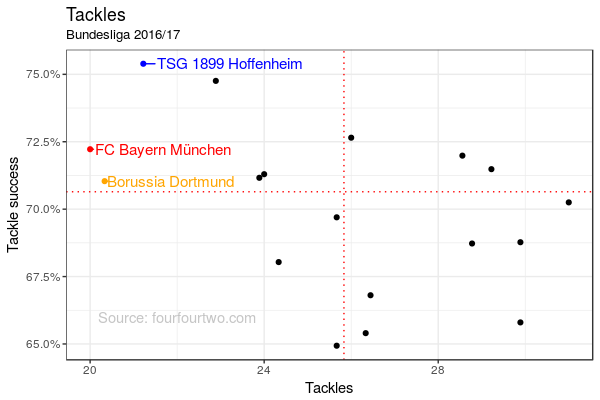
(Analytics: Lukas)
Penetrative going forward, not perfect at the back
With the ball, Hoffenheim’s game is very varied and built on asymmetry. In build-up they play with a back-three. Süle is particularly active here, building many connections with the more advanced players and even moving into midfield situationally. Depending on the pressing of the opposition, he varies between half-back and full-back.
Similar goes for the wing-backs. Steven Zuber positioned himself against Hertha clearly deeper than Pavel Kaderábek, his opposite number on the right. At times then a 4-1-3-2-type formation came about. The team aligns itself very intelligently to the situation at the time.
Sebastian Rudy, who is the somewhat deeper defensive-midfielder in the build-up and thus is a connecting player, Kerem Demirbay and Lukas Rupp are the likely options for the midfield three. All three are strong runners and thus make access to the centre difficult for the opposition.
Going forward, Bayern’s next opponents always try to create connections in attack. The team moves itself smartly between the lines and creates a lot of shooting opportunities. At the time it’s 16.9 per game and so the second most behind Bayern (17.9).
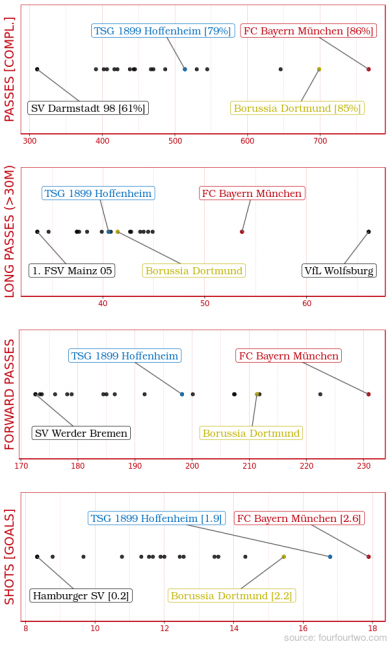
(Analytics: Lukas)
Solely the scoring record of 17 goals is sub-optimal. Since there remain problems against the ball, in close games a better conversion rate is missing. But Hoffenheim is on a very high level here, their 17 goals are the third best in the league, only behind BVB (20) and Bayern (23).
So it’s worthwhile to look at the defence. The TSG does have problems individually here. Especially on the wings my duels are lost, leading to break-troughs for their opponents. Zuber is one of the players still searching for the right balance and thus opening up a lot of green in his back at times. If him and Arjen Robben will play, this should be an interesting match-up.
Furthermore, the Nagelsmann system is mentally challenging. Players are usually primed to want the ball. To mitigate certain duels and only mark your opponent needs a high level of concentration and also patience.
One should not be overly critical. Before the season, only few people were expecting a team, which just prevented relegation, to put up a fight for the international spots. Nagelsmann learned his team tactical discipline and made them impressively penetrative. His ideas are increasingly visible on the pitch and the TSG is one of the few teams that are dangerous in transition and also in possession phases.
Julian Nagelsmann will have noticed Bayern’s problems against pressure and so a 3-1-3-2/5-3-2 formation is expected. This approach lets Hoffenheim clogg up the centre, isolate Bayern on the wings and block the passing lanes, if the positioning is right.
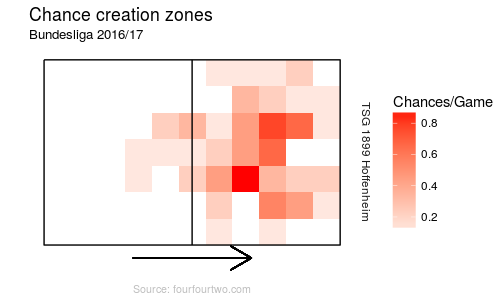
(Analytics: Lukas)
Validation check for Bayern
Despite their position in the table, Hoffenheim are often underestimated. Very often their current position is explained with the weak form of the big clubs, but that’s far from the real truth. Leipzig, Hoffenheim, Köln and also Hertha show what can be achieved with a clear playing philosophy and determination. That’s no coincidence.
The TSG has all the tools to ruin Bayern’s match-day. Nagelsmann intensely analyses his opponent and focuses on the areas where the ball is overturned. He tries to lure them in these zones, to attack with high pressure. His team moves intelligently, presses high up the field and doesn’t lose its shape and compactness in the centre.
After Frankfurt every opponent played a deep midfield or even deep pressing against Bayern. This makes it hard to evaluate, if Bayern has learned from their mistakes. Small adjustments in offense have already lead to large success. Recently the two wingers move further inside, the two number eights have more courage in pushing up and thus creating overloadings in certain zones. Bayern’s ball retention was up, they again controlled games and got more players in the important zone 14.
Additionally Robben is back. He cuts inside, opens space for the attackers and feeds them or takes the shot himself. It sounds easy, but Robben is doing it on an remarkable level. He carries Bayern’s offensive at times and is mentally strong enough to keep his calm and stay positive, when things are not going Bayern’s way. Maybe his biggest difference to Franck Ribery. When he is as in sync with his teammates as in Augsburg, he one of the best players in Europe. If Robben plays against Hoffenheim, he will take on a big role.
Can Ancelotti’s team control the centre or will they again lose the dominance against a well shifting team? The individual quality is clearly in favour of Bayern, but when Hoffenheim can reach their best, it will be more than a highlight game, it will be a validation check for Bayern.
Statistics
Last five games against TSV 1899 Hoffenheim
- FC Bayern 2-0 1899 Hoffenheim (Bundesliga, 19. matchday 2015/16)
- 1899 Hoffenheim 1-2 FC Bayern (Bundesliga, 2. matchday 2015/16)
- 1899 Hoffenheim 0-2 FC Bayern (Bundesliga, 29. matchday 2014/15)
- FC Bayern 4-0 1899 Hoffenheim (Bundesliga, 12. matchday 2014/15)
- FC Bayern 3-3 1899 Hoffenheim (Bundesliga, 28. matchday 2013/14)
Overall record
- 16 games, 12 Bayern wins, 4 draws
- 38 FCB goals, 11 TSG goals
- Current streak: Bayern hasn’t lost against Hoffenheim, yet. They won the last four games.
Fun Facts
- The streak of 16 undefeated games is a Bundesliga record.
- In six out of 16 matchups, Hoffenheim was leading at some point in the game.
- Against no other team have Hoffenheim conceded as many goals. (26, more than 3 per game).
- Bayern scored at least twice in all of their eight home games against the TSG.
- Arjen Robben scored five goals and assisted four more in his last six home games against Hoffenheim.
- Bayern won three games with goals scored in the 90th minute or in injury time (always 2-1).
- Lewandowski scored more goals against Oliver Baumann, than any other keeper.
- In eleven games against the TSG, Ribéry was involved in 15 goals.
- All 16 games were sold out.
- TSG Hoffenheim is in third place in the “Nagelsmann table”, incorporating all results since Julian Nagelsmann took the helm in Hoffenheim.
Five bold predictions
- Bayern will score at least two goals.
- Robben will be involved in at least one goal.
- Hoffenheim will also score at least one goal.
- The record champion will score with a header.
- Alonso won’t play.
All five predictions for the Bundesliga game against Augsburg were correct. Current standing: 34/70.
Erfolgsfans bring back FCB fan chants to life
The Erfolgsfans have re-published Bayern’s first two hymns “Rot und Weiß” and “Bayernlied”. These two songs will be presented by stadium announcer Stephan Lehmann and “project lead” Ruben Schulze-Fröhlich in the Allianz Arena. You can listen in and download the two songs here.
Both songs are also available on YouTube:
Rot und Weiß (1905)
Bayernlied (1907)
Kudos to Erfolgsfans and thank you for all the hard work that was necessary to make this happen.



